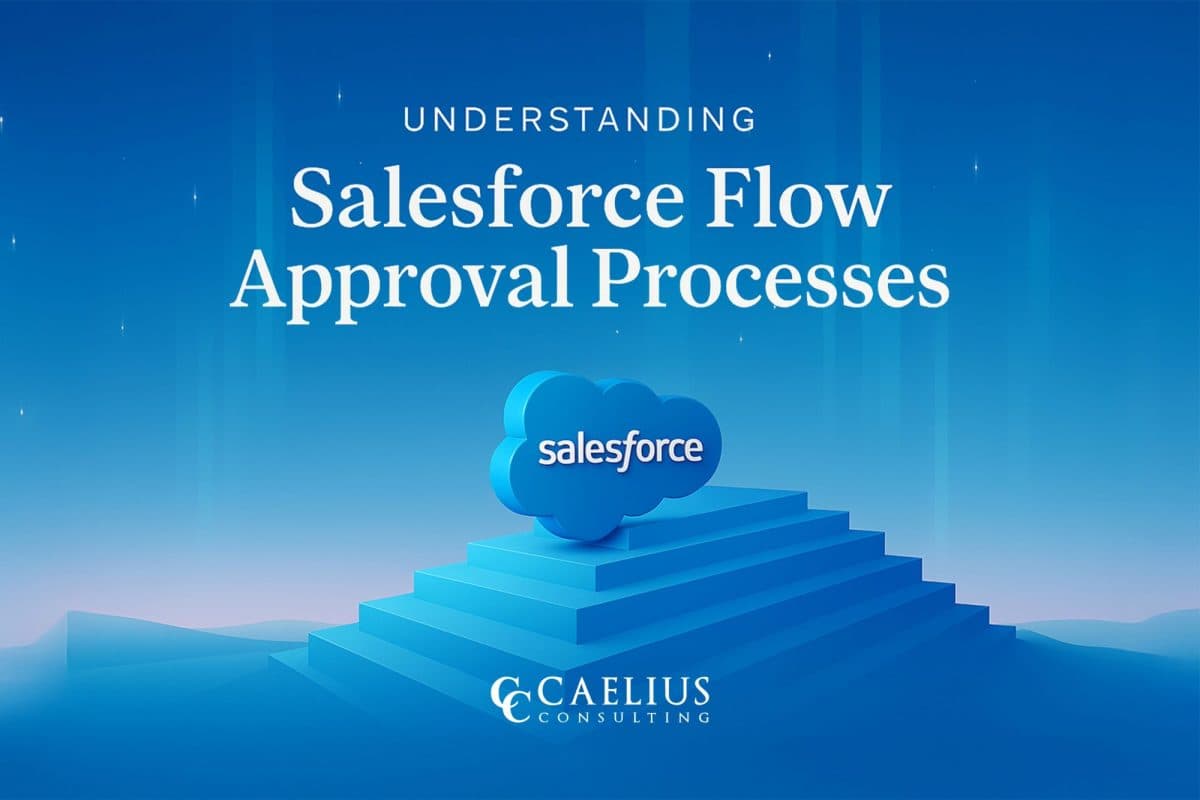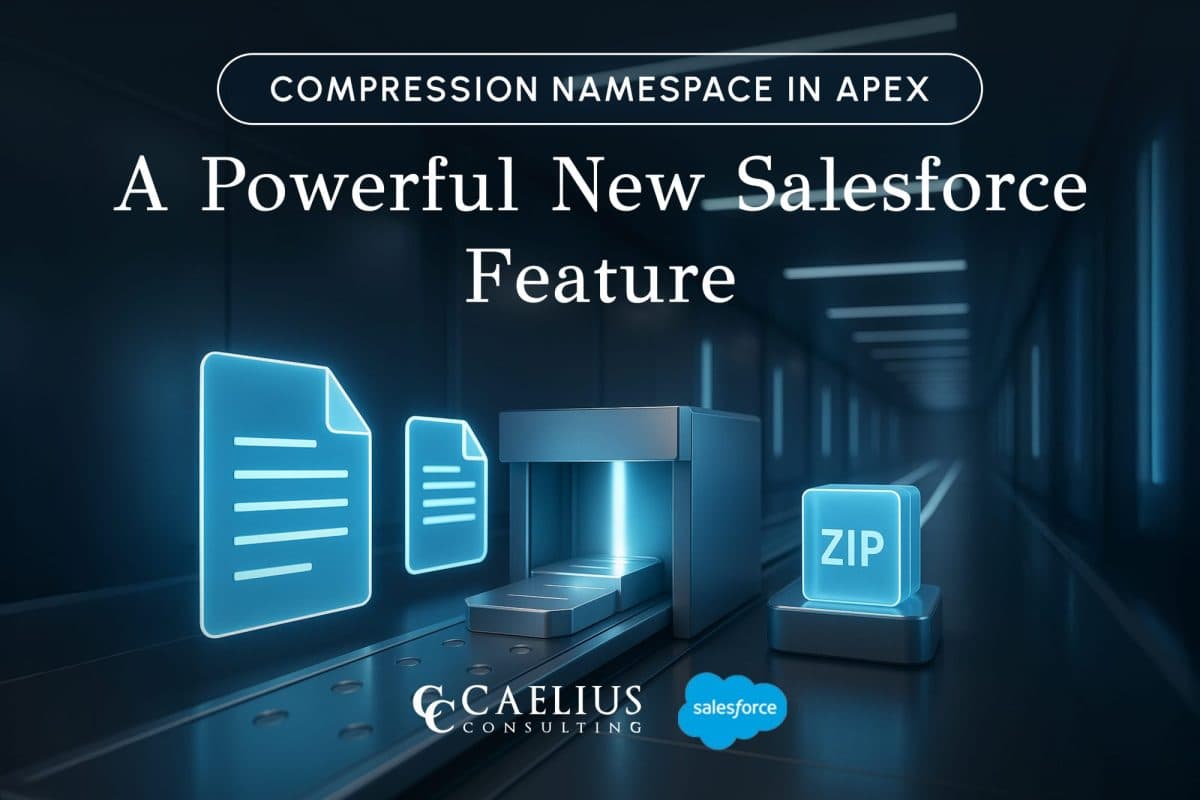Understanding Salesforce Flow Approval Processes

Introduction: Salesforce introduced Flow Approval Processes in the Spring ’25 release. This is an evolved version of the classic approval process model, powered by Flow Orchestrator. The new approach brings unprecedented flexibility, enabling the creation of dynamic, multi-level, and logic-driven approval workflows that are entirely declarative. Continue reading the blog to get a deeper understanding of the stages, steps, and dynamic decision-making in approval processes in Salesforce.
What is a Flow Approval Process in Salesforce?

Key Concepts of Flow Orchestrator
Flow Orchestrator serves as the backbone of Flow Approval Processes. It allows you to design an approval workflow that can
- Chain together approval steps and background tasks
- Use stages to organize steps into logical groupings
- Implement decision logic to dynamically control the path of the approval process
With Flow Orchestrator approval workflows can become more dynamic and adaptable, integrating seamlessly with your organization’s needs.
Types of Flow Approval Processes
1. Record-Triggered Flow Approval Process

How it works: This type behaves similarly to how we traditionally think of approvals. It automatically initiates when a record (e.g., Opportunity, Case, Custom Object) is created or updated and meets specific entry criteria defined within the Flow.
Use Cases: Ideal for standard scenarios like:
- Discount approvals on Opportunities
- Expense report submissions
- Time-off requests when a record hits a certain status or value
2. Autolaunched (No Trigger) Flow Approval Process

- Another Flow (e.g., a Screen Flow guiding a user through a submission)
- Apex code
- Process Builder (though Flow is the future)
- Custom buttons or links
- Even external systems via APIs
Approval Stages & Steps
A Flow Approval Process consists of Stages and Steps, each defining critical parts of the approval journey.

- Stages represent major milestones or phases within an approval process (e.g., “Manager Approval,” “Director Approval,” “Finance Review”). A process can have multiple stages, executed sequentially or in parallel (depending on configuration).

-
Steps are the individual tasks that make up each stage. A step typically involves assigning the approval request to a specific user, queue, or dynamically determined approver. You can define entry criteria for steps, actions upon approval/rejection at the step level, and assignees.

Types of Steps

- Approval Steps – Interactive steps that require user input (built using screen flows).
- Background Steps – Automated tasks like email notifications or record updates (built using autolaunched flow)
Enhancing the Approver Experience with the Work Guide
One of the most exciting aspects of Flow Approval Processes is the Work Guide. This feature leverages Screen Flows to provide approvers with a rich, contextual experience.
Instead of the standard “Approve/Reject” options, the approver can design a screen flow that displays relevant record details, related information, and instructions. It can even allow the approver to input additional data or comments directly within the approval interface.

Recalls: Essential Control for Submitters:
The Flow Approval Processes include the ability for a submitter to recall an approval request before it’s fully approved. This crucial feature allows submitter to retract their if necessary, keeping the workflow agile and flexible.
Flow will provide actions or mechanisms to manage this recall process, likely updating record statuses and notifying relevant parties.
Dedicated Approvals App for Workflow Management
Salesforce provides a Dedicated Approvals App that helps manage all the orchestrations and monitor approval statuses. With native visibility through the Approvals app and Work Guide, users can stay on top of their approval processes and track progress in real time.



Why Use Flow Approval Processes?

Conclusion
The flexibility, efficiency, and simplicity of Flow Approval Processes in Salesforce, let’s you automate and streamline approval workflows without the need for custom code. Whether you’re handling standard approvals or complex, multi-step processes, Flow Orchestrator provides the tools to optimize your Salesforce experience.
Want to implement Flow Approval Processes in your Salesforce environment? Reach out to us today for expert guidance and personalized solutions.
Recent Blogs

Designing for Reality: Integrating 837 Claims When X12 Meets Production
Designing 837 Claim Integration for Real-World Healthcare Systems When it comes to 837 claim integration, most architects assume the X12 specification guarantees predictability. On paper, the 837 Professional, Institutional, and Dental transactions look clean and orderly. In production? Not even close. Real-world 837 files behave differently across trading partners. Loops appear conditionally. Repeatable segments shift… Continue reading Designing for Reality: Integrating 837 Claims When X12 Meets Production
Designing for Reality: Integrating 837 Claims When X12 Meets Production
Designing 837 Claim Integration for Real-World Healthcare Systems When it comes to 837 claim integration, most architects assume the X12 specification guarantees predictability. On paper, the 837 Professional, Institutional, and Dental transactions look clean and orderly. In production? Not even close. Real-world 837 files behave differently across trading partners. Loops appear conditionally. Repeatable segments shift… Continue reading Designing for Reality: Integrating 837 Claims When X12 Meets Production

AI-Driven PDF Parsing in Salesforce
Introduction For the current digital ecosystem, data is an important aspect for decision-making. Yet, for many organizations, a significant portion of this valuable data remains locked away in unstructured formats. Organizations handle thousands of PDF documents daily — ranging from contracts and invoices to lab reports, quotations, and service agreements. Traditionally, extracting structured data from… Continue reading AI-Driven PDF Parsing in Salesforce
AI-Driven PDF Parsing in Salesforce
Introduction For the current digital ecosystem, data is an important aspect for decision-making. Yet, for many organizations, a significant portion of this valuable data remains locked away in unstructured formats. Organizations handle thousands of PDF documents daily — ranging from contracts and invoices to lab reports, quotations, and service agreements. Traditionally, extracting structured data from… Continue reading AI-Driven PDF Parsing in Salesforce

Compression Namespace in Apex: A Powerful New Salesforce Feature
Introduction Working with documents inside Salesforce has always challenged developers because of the platform’s multitenant constraints. Previously, packaging and sending files in a compact form required external services, like an AWS Lambda function, that retrieved files via API and then compressed them. With the introduction of the Compression Namespace and the powerful pre-defined Apex functions,… Continue reading Compression Namespace in Apex: A Powerful New Salesforce Feature
Compression Namespace in Apex: A Powerful New Salesforce Feature
Introduction Working with documents inside Salesforce has always challenged developers because of the platform’s multitenant constraints. Previously, packaging and sending files in a compact form required external services, like an AWS Lambda function, that retrieved files via API and then compressed them. With the introduction of the Compression Namespace and the powerful pre-defined Apex functions,… Continue reading Compression Namespace in Apex: A Powerful New Salesforce Feature

Boost LWC Performance with Debouncing
Introduction Lightning Web Components (LWC) is a modern framework for building fast and dynamic user interfaces on the Salesforce platform. However, one common challenge in web development, including LWC, is efficiently handling user input, especially when dealing with rapid or repetitive events, such as typing in a search field. This is where debouncing becomes an… Continue reading Boost LWC Performance with Debouncing
Boost LWC Performance with Debouncing
Introduction Lightning Web Components (LWC) is a modern framework for building fast and dynamic user interfaces on the Salesforce platform. However, one common challenge in web development, including LWC, is efficiently handling user input, especially when dealing with rapid or repetitive events, such as typing in a search field. This is where debouncing becomes an… Continue reading Boost LWC Performance with Debouncing